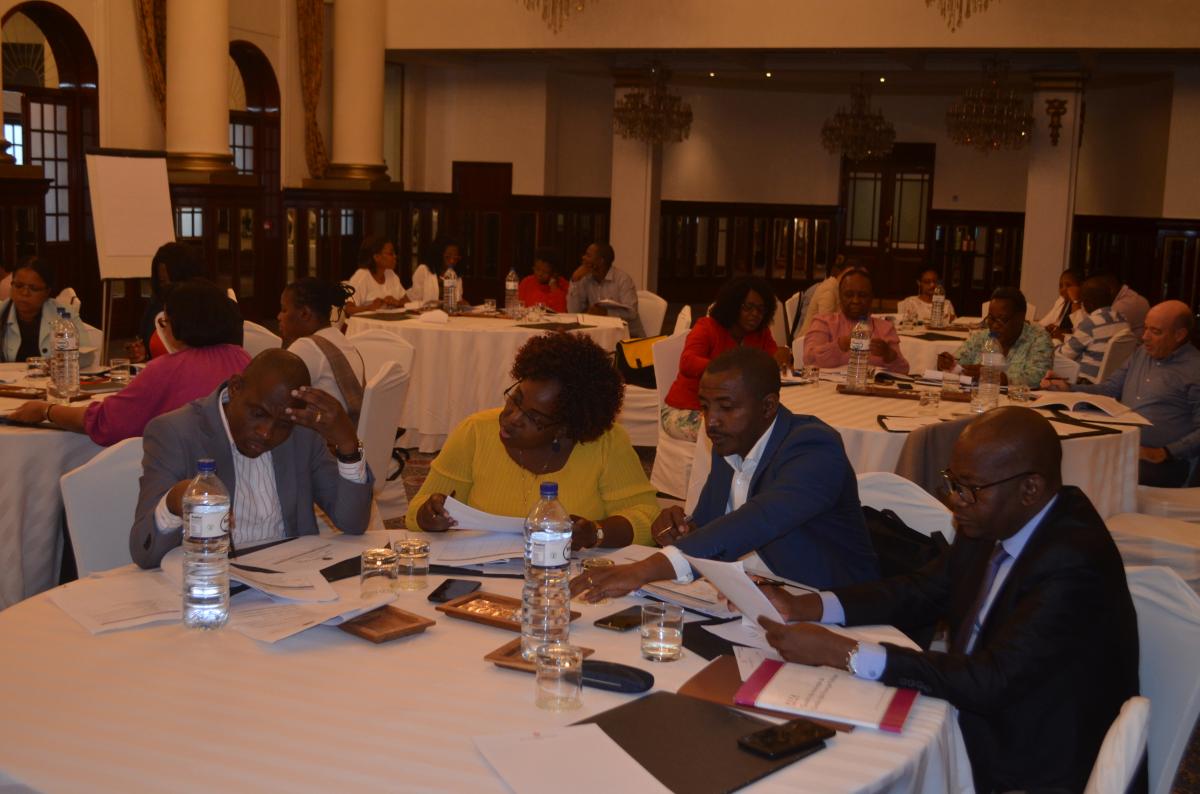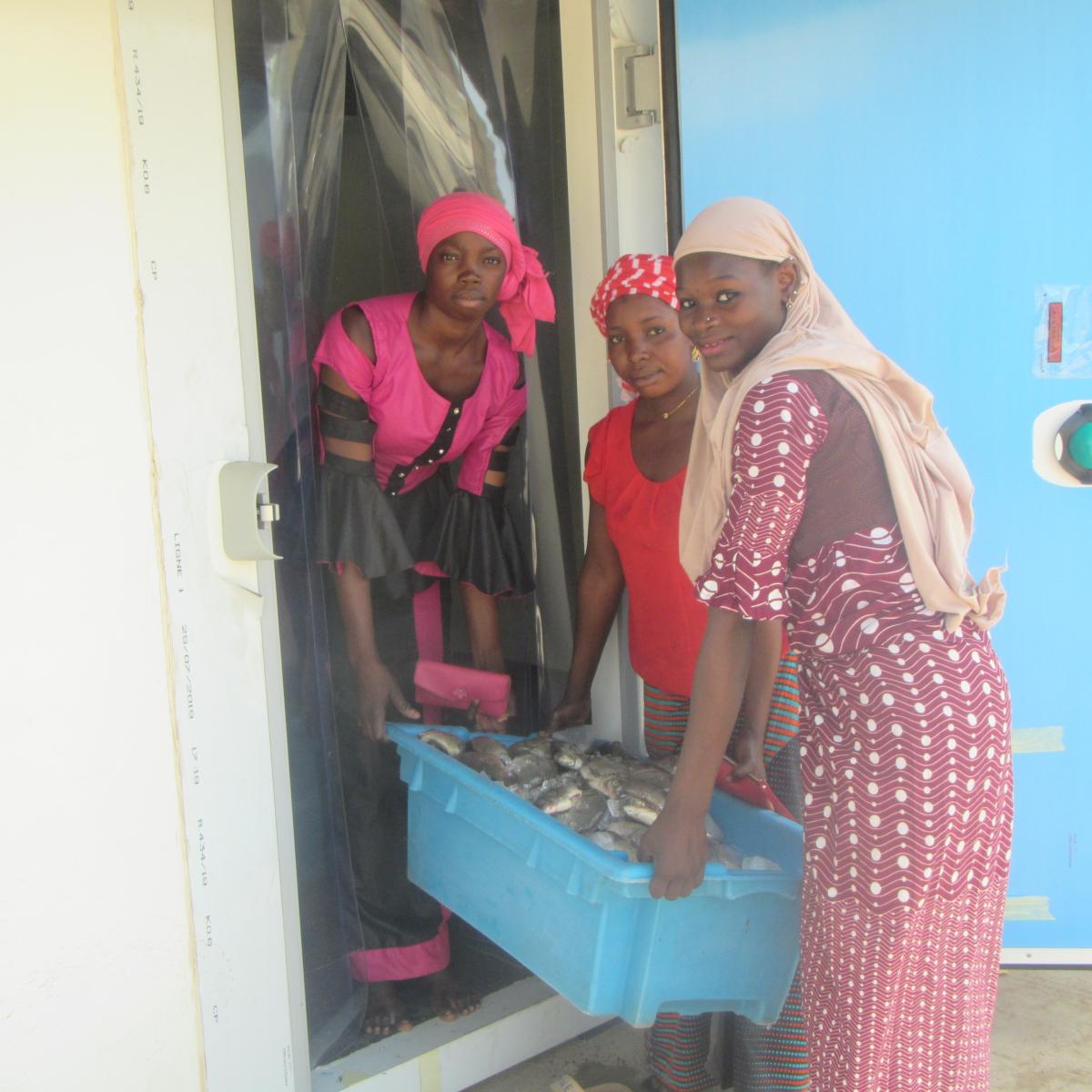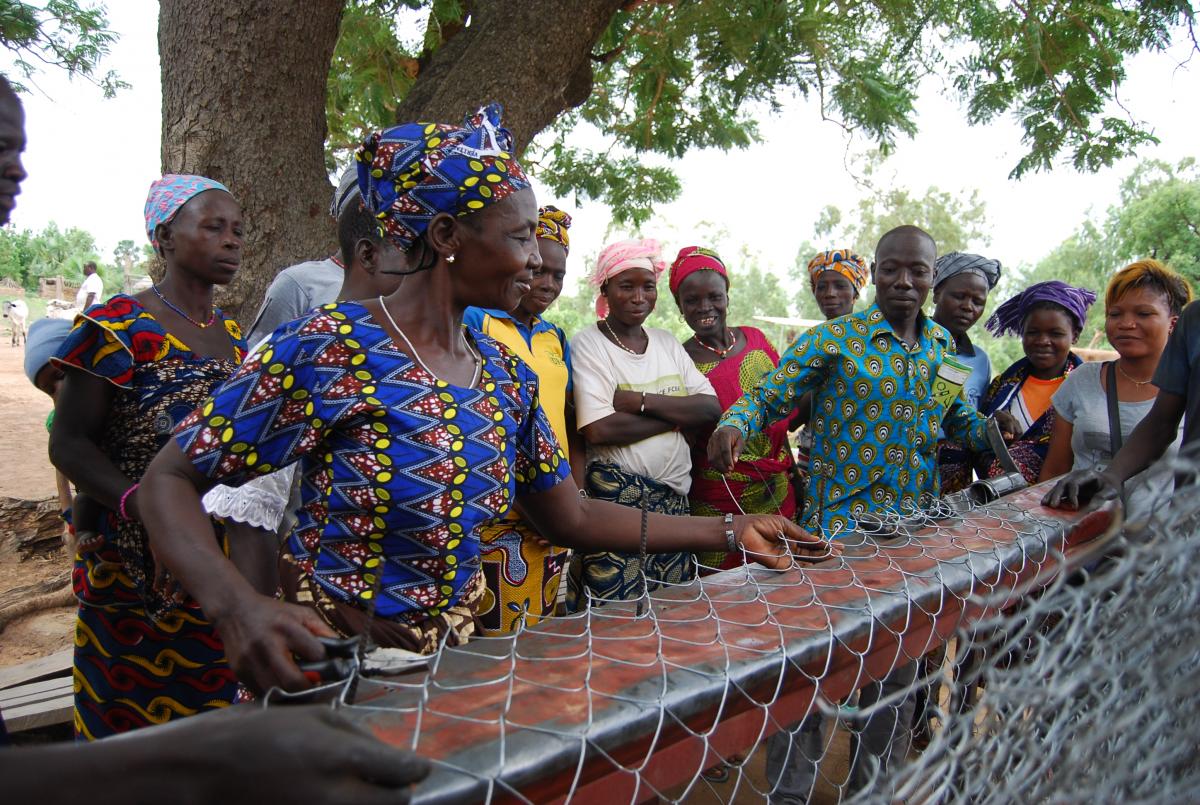Search
Viewing 2205 to 2220 of 3126 news
-
PEFA 2019 seminar assessment launch and workshop on Mozambique’s health sector
Akila MUNIR | 29/04/2020
By: J. Waterschoot and D. Stella The Ministry of Health and the Development Partners agreed upon a harmonised PFM analysis plan. The Memorandum of Understanding (MoU) for the Health sector common fund, known as PROSAUDE, foresaw a PFM analysis plan that became the basis of the Harmonised plan; The MoU requires a Public Expenditure and Financial Accountability (PEFA) assessment to be conducted in 2019, which provides evidence to drive reforms for improving health expenditure efficiency. For the 2019 PEFA Assessment, Enabel, jointly with the Swiss Development Cooperation, funded this assessment. The Government of Flanders is a cooperation partner of the Ministry of Health and the Mozambican health sector. The Government of Flanders also funds the GTAF3 project, and through Enabel, it provides, technical assistance in Public Financial Management for the sector. Enabel decided to invest some of GTAF3 funds in a Public Expenditure and Financial Accountability (PEFA) evaluation of the health sector, which will provide information about the sector’s PFM performance. As such, the PEFA is the measure that will tell whether there was progress, it takes the system’s “temperature”. As mentioned in the introduction, the PEFA assessment is a specific requirement of the MoU for the PROSAUDE Common Fund and is part of the Harmonised PFM analysis plan agreed between the Ministry of Health and the Development Partners. Thus far, 2 PEFA assessments of the health sector have been made in Mozambique, with the previous evaluation dating back to 2015. The new evaluation covers the period 2016 to 2018, that is, the last three years with consolidated accounting information and uses the ‘PEFA 2016’ methodology. It will help gauge the progress done since then. A PEFA is an evaluation of a country’s public financial management performance. The methodology can be applied to assess the central government’s financial management or the performances of lower levels of government. It assesses the strengths and weaknesses of pubic financial management and provides a complete and consistent analysis, using quantitative and qualitative indicators measuring performances. Considering that the purpose of a PFM system is to guarantee fiscal discipline and ensure strategic allocation of resources for efficient services, the PEFA methodology measures how the PFM system fulfills this purpose. As such, a PEFA assessment provides a country with an analytical and detailed tool to discuss the performance in managing public finances and assesses the extent in which PFM systems, processes and institutions perform against the standards for each one of the seven pillars that constitute the PEFA framework (for details on the PEFA framework please refer to the official web page www.pefa.org). For this PEFA, the Standard Methodology 2016 needed to be adapted to a sector evaluation. The consultants that were awarded the contract proposed a selection of 23 out of 31 indicators. A PEFA evaluation includes a launching seminar, with the aim of familiarising government officials and other stakeholders with the PEFA methodology. This seminar was held on March 18th, 2020 and organised by a team of international and local consultants. The team leader could not be present due to the Covid-19 travelling restrictions. Nonetheless, with a clearly structured presentation, the local consultants explained the PEFA methodology and its indicators, and informed stakeholders on the purpose of the evaluation and about the future use of its results. In addition, the consultants explained the rational of the selection of indicators, highlighting the relevance of the choice made. The audience were mainly government officials working in various directorates and institutions in the health sector. Officials from the Ministry of Economy and Finance also participated, as well as members of the donor community and from civil society organisations. Through participative discussions and group exercises on PEFA, this training provided participants with an insight of the tools and the framework to analyse the sector’s public financial management. In addition, it would provide the criteria to design reforms to meet the recommended underlying standard considered for a PEFA evaluation to strengthen the management of public finances. The ultimate objective is to provide the sector with improved PFM systems which, in turn should result in better health outcomes. After the introduction to the PEFA methodology and indicators, the participants to the workshop were involved in a group exercise. Each group was assigned a PEFA pillar, for which they had to identify the strong and weak points in the Mozambican Health sector and formulate further recommendations for possible or necessary reforms. This active way of learning made the information and possibilities of a PEFA assessment easier to digest, especially considering that most of the participants did not have experience with a PEFA assessment before this seminar. A PEFA aims at improving PFM and its credibility. Therefore, by taking a snapshot of the PFM performances in all components (planning, budgeting, executing, accounting and reporting, assets management, audit and control and oversight indicators in the cluster SDG16), it is possible to lay a path for improving the performances. Thus, it can be expected that the production of services will ultimately improve performances helping progress in Health service delivery outcomes indicators clustered in SDG3. With the launching seminar, the PEFA 2019 assessment officially started. There are several next steps in the PEFA evaluation. The preparatory report has been completed, while the final report is scheduled by the end of August (not considering the delays that the current pandemic can introduce). Through this seminar, government officials had a primary introduction to the PEFA and the purposes it serves. The workshop wanted to prepare the grounds for the following stages of the assessment that is the data collection basis for the evaluation. Enabel hopes that the final PEFA report and the seminar will give officials an instrument to measure PFM progress in their sector. As such, participants will be able to use the evaluation, its conclusions and recommendations for implementing further PFM reforms in the sector.
-
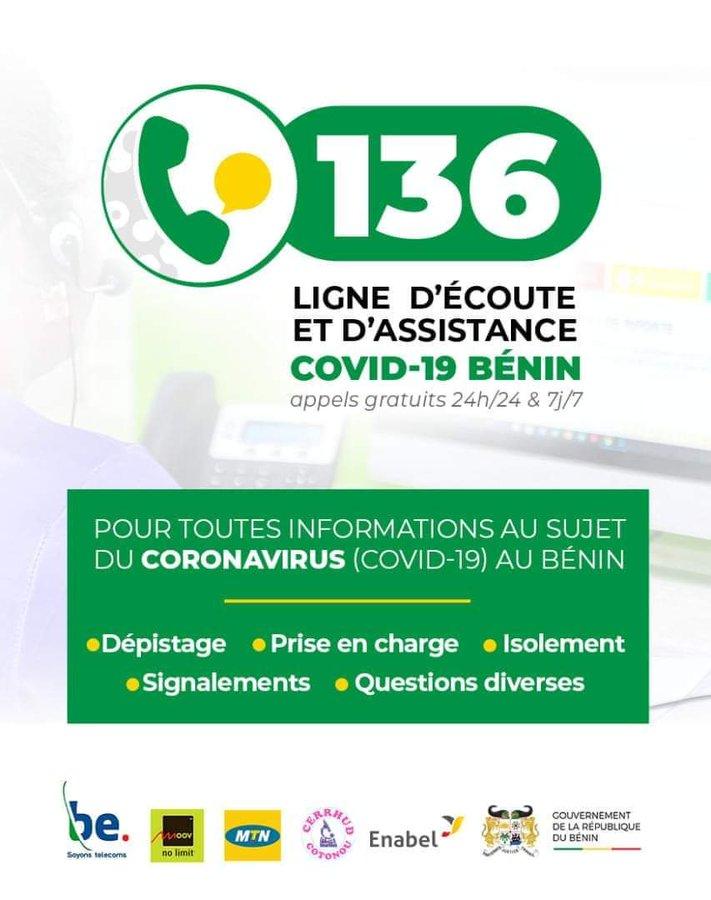
Le centre d’appel Covid19 Bénin est désormais joignable au numéro 136 !
Reece-hermine ADANWENON | 28/04/2020
Qu'il vous souvienne que dès le début de cette crise sanitaire au #Bénin, la #Coopérationbelge à travers son Agence #Enabel a accompagné le gouvernement dans la mise en place d’une centrale téléphonique.Aujourd’hui grâce à l’appui continu de #Enabel au #gouvbenin pour la riposte contre #Covid19, le fonctionnement, la capacité et la qualité de réception des appels de la centrale téléphonique ont été améliorés. Les numéros Mtn (51 02 00 00 et 51 04 00 00) qui étaient utilisés ont été switchés vers un numéro vert : 136. Avec le 136, il y a une possibilité de réception de 16 appels simultanés au lieu de 04 au départ.Pour toutes vos informations au sujet du #Coronavirus (dépistage, prise en charge, et questions diverses), appelez gratuitement le 136, joignable 24h/24h et 7 jours / 7.#SantéEnCommun#StopCoronavirus#EnabelImpact
-
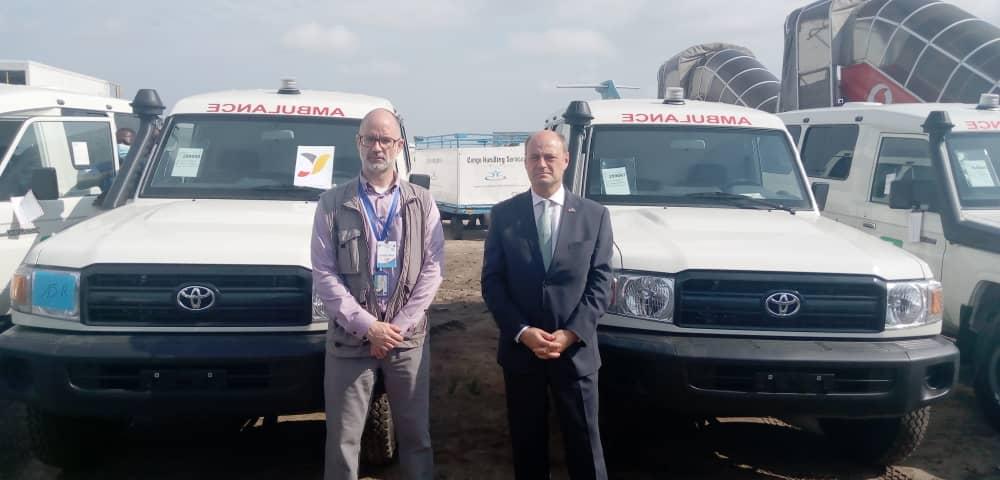
Des ambulances en RDC pour améliorer la prise en charge, la Belgique à l’écoute des besoins dans la riposte au Covid-19
Grâce MALI FAIDA | 28/04/2020
L’ambassadeur de Belgique Jo Indekeu a assisté le Samedi 11 Avril 2020 à l’arrivée de l’avion-cargo transportant en son sein les 4 ambulances commandées en urgence suivant le besoin émis par le Secrétariat Technique de la Riposte Covid9.D’une valeur globale de 227.000 Euros, ces ambulances sont destinées aux hôpitaux de référence désignés pour la prise en charge des patients Covid19 à Kinshasa. Ils permettront d’accélérer les déplacements des malades de leurs résidences vers les hôpitaux ou d’un hôpital à un autre.Ces ambulances complétement équipées ont été acquises en urgence grâce à la célérité de l’équipe du Programme d'Appui au Niveau Central (PANC) d’Enabel, l’agence belge de développement. Le représentant d’Enabel, M. Philippe-Serge Degernier et le Coordonnateur du Programme Santé, M. Patrick Van Dessel étaient présents aux cotés de l’ambassadeur pour réceptionner ces véhicules.Ces ambulances seront officiellement remises au Secrétariat Technique de la Riposte dans les prochains jours. La Belgique en est à son 4ème geste de soutien dans la lutte contre cette épidémie en RDC, après la remise d’un lot d’un million de comprimés de chloroquine au Ministre de la Santé pour assurer le traitement des patients selon le protocole adopté.
-
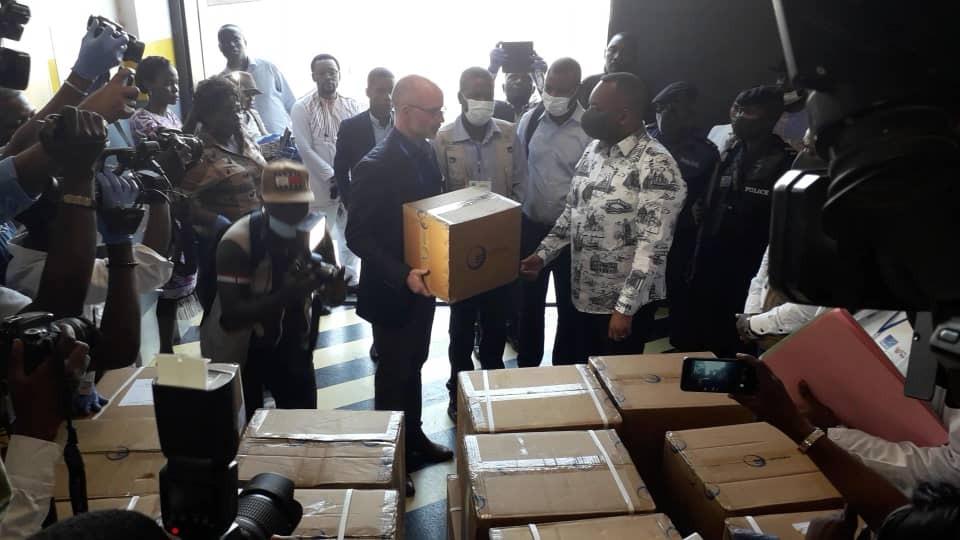
Covid-19: La Belgique poursuit son appui à la riposte avec l'aide du PANC
Grâce MALI FAIDA | 28/04/2020
La Belgique, au travers d'Enabel, a financé à hauteur de 42.500€un chargement de Chloroquine pour la riposte Covid19. Ce lot de 1.000.000 de pilules de chloroquine a été mis à disposition grâce au partenariat avec la FEDECAME, une asbl de droit congolais qui a reçu délégation de mission de service public du Ministère de la Santé pour l’achat et la distribution des médicaments et autres produits de santé à destination du système public de santé de RDC.La remise a eu lieu le lundi 06 Avril 2020 en présence du ministre de la santé, M. Eteni Longondo, du Représentant-Resident d'Enabel, M. Philippe-Serge Degernier, du Secrétaire General de la FEDECAME, M. Jean-Claude Deka et du Directeur du Progr. National d'Approvisionnement en médicaments (PNAM) M. Franck Biayi. Enabel est un partenaire historique de la FEDECAME et le Programme d'Appui au Niveau Central (PANC) l’appuie dans son fonctionnement quotidien ainsi que par des activités de renforcement de capacités.Poursuivant dans sa lancée pour permettre une riposte efficace contre le Covid19 en RDC, la Belgique en est à son 3e geste de soutien depuis le début de l'épidémie en RDC.
-
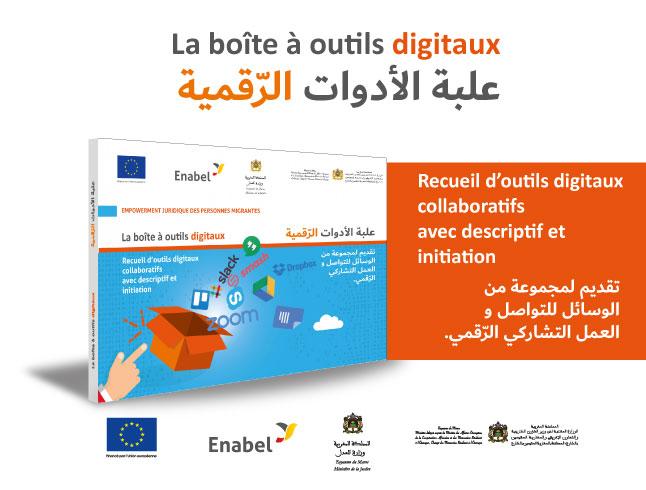
La boîte à outils digitaux: un guide pratique pour les associations en contact avec les personnes migrantes au Maroc
Bilal ALJOUHARI | 22/04/2020
Face au confinement actuel et la nécessité de réadapter les habitudes de travail, le projet a développé une boîte à outils bilingue à destination des associations travaillant avec les personnes migrantes afin d’appuyer les personnes moins à l’aise avec les solutions digitales à s’adapter aux contraintes de travail actuelles. L’idée de créer la boîte à outils est née du constat qu’étant donné les restrictions actuelles de mouvement, certaines associations avec lesquelles le projet collabore ne disposaient pas d’outils/n’avaient pas connaissance des outils qui leur permettaient de continuer à travailler en réseau, à coordonner leurs actions et à apporter une assistance aux migrants, réfugiés et demandeurs d’asile. Bien qu’initialement destinées aux associations travaillant sur la migration, les informations disponibles dans la boîte à outils sont utiles pour tout type de structure.La boite à outils regroupe des informations sur les modalités d’utilisation de différentes solutions digitales qui sont gratuites et assez faciles d’utilisation et qui vont permettre d’appuyer les associations dans leur coordination et travail en réseau.Lien : https://issuu.com/enabel.maroc/docs/boite___outils_digitaux
-
Installation d’une chambre froide solaire sur un marché de gros de Ségou au Mali
Nènè TRAORE | 21/04/2020
Dans le cadre du renforcement de capacité des acteurs de la filière, le Projet d’Appui à la Filière Halieutique (PAFHa) a installé une chambre froide solaire sur le site II du marché ex autogare à Ségou, où opèrent une douzaine de mareyeuses grossistes et demi-grossistes. Les mareyeuses bénéficiaires ont auparavant été formées à l’utilisation de cet équipement lors d’une séance organisée le 5 mars 2020. L’étude en cours sur les flux de poisson frais estime que 2450 tonnes/an de poisson frais arrivent à Ségou dont 25% sont redirigés sur Bamako. Les activités de gros et de demi-gros exercé à Ségou nécessitent le stockage temporaire de poisson frais sur les sites de marchés. La chambre froide a été dimensionnée pour pouvoir stocker en permanence jusqu’à 1,6 tonnes de poisson frais à 2°C. Elle est entièrement alimentée par un champ de panneaux solaires. Le poisson frais y est entreposé dans des bacs gerbables, sous glace afin de réduire les pertes post-captures afin d’augmenter globalement la valeur ajoutée créée au sein de la filière.
-

Appui à la riposte contre le Covid-19: la Coopération belge offre 2 ambulances au Ministère de la Santé
Reece-hermine ADANWENON | 14/04/2020
Mme Mélanie Schellens, chef de la Coopération belge à l’Ambassade de Belgique près le Bénin a remis ce mardi 14 avril 2020 au Dr Ali IMOROU-BACHABI, Secrétaire Général du Ministère de la Santé, les clés de 2 ambulances. D’un coût total de 53 millions de Fcfa, ces ambulances entièrement médicalisées disposent de bouteille d’oxygène, d’aspirateur et des équipements nécessaires pour la stabilisation et le transport des malades.Le Bénin, à l’instar des autres pays du monde n’est pas épargné par la pandémie du #Coronavirus. Cette crise sanitaire mondiale vient s’ajouter aux maux traditionnels de santé notamment la mortalité maternelle et néonatale, que les autorités sanitaires avec le soutien des partenaires techniques et financiers essaient d’éradiquer. Dans le cadre de la riposte contre le Covid-19, la Coopération belge au Bénin à travers le Programme d’Appui à la Santé Sexuelle et Reproductive et à l’Information Sanitaire (P@SRIS) exécutée par l’Agence belge de développement a acquis deux ambulances, en plus de la mise en place d’une Centrale téléphonique d’Appel. Destinées aux Zones Sanitaires d’Abomey-Calavi-Sô-Ava et Allada-Zè-Toffo, ces ambulances permettront de renforcer dans un premier temps, le dispositif de riposte au Covid-19 et dans un second temps, de renforcer le système de santé notamment la référence dans ces localités afin de réduire les décès maternels, néonataux et infantiles. Dans son allocution, Mme Mélanie Schellens a salué les efforts remarquables du Bénin pour limiter la propagation du #Coronavirus, pour la prise en charge des personnes atteintes et pour protéger les populations. A l’en croire, la mise à disposition du Ministère de la Santé de ces deux ambulances est l’expression de la solidarité du Royaume de Belgique envers la République du Bénin dans ces moments difficiles. Par ailleurs, Mme Mélanie Schellens a annoncé qu’une troisième ambulance est en voie d’acheminement vers Cotonou. De même, selon elle, le partenariat entre Enabel et l’Agence Française de Développement (AFD) a permis de mobiliser près d’un million d’Euros destinés à renforcer la mobilisation sociale, à améliorer les capacités de dépistage et à renforcer les capacités de prise en charge des personnes atteintes du #Coronavirus. D’autres appuis de la Belgique sont attendus dans les prochaines semaines et seront redimensionnées en fonction des besoins. Dr Ali IMOROU-BACHABI, Secrétaire général du Ministère de la santé a, quant à lui, remercié la Coopération belge pour cette mobilisation contre le Covid-19 et son appui constant au système de santé du Bénin. Il a rassuré du bon usage de ces ambulances qui feront l’objet d’une maintenance préventive et curative régulière, a-t-il indiqué. Suivons ici l’intégralité des propos de Mme Mélanie Schellens et du Dr Ali IMOROU-BACHABI
-
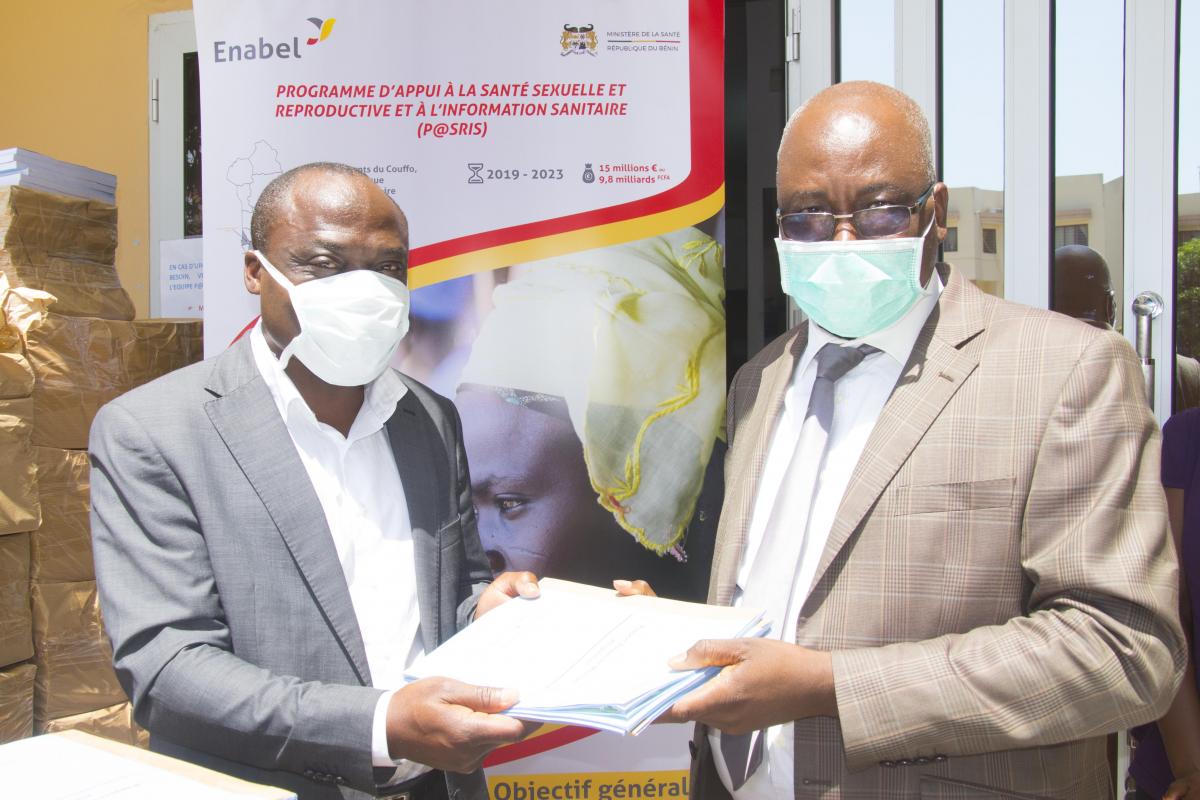
Amélioration de la fiabilité des données du SNIGS: des outils de collecte d’information révisés à disposition
Reece-hermine ADANWENON | 10/04/2020
D’un coût global d’environ 60 millions de FCFA, ces outils de collecte d’informations contribueront à l’amélioration de l’exhaustivité et de la fiabilité des données de routine du Système National d’Information et de Gestion Sanitaire (SNIGS) à travers le renforcement de la disponibilité des données pour la prise de décision et la redevabilité sociale. La remise officielle des outils a été effectuée, le jeudi 09 Avril 2020 par l’Intervention Manager du Programme d’Appui à la Santé Sexuelle et Reproductive et à l’Information Sanitaire (P@SRIS) au Secrétaire Général du Ministère de la Santé. A en croire le Dr Ali IMOROU BACHABI, ces outils révisés et imprimés qui sont mis à la disposition du Ministère de la santé permettront de collecter des informations de routine concernant les données épidémiologiques, les ressources humaines, financières, infrastructures, équipements et le matériel au niveau de toute la pyramide sanitaire. A ce propos, il a remercié la Coopération belge qui, à travers son Agence belge de développement « Enabel », reste l’un des partenaires traditionnels et fiable du Ministère de la Santé. Dr Elysée SOMASSE, Intervention Manager du P@SRIS pour sa part, a rassuré de ce que les agents de santé appelés à utiliser ces outils seront formés pour un usage judicieux et complet de ces derniers.
-
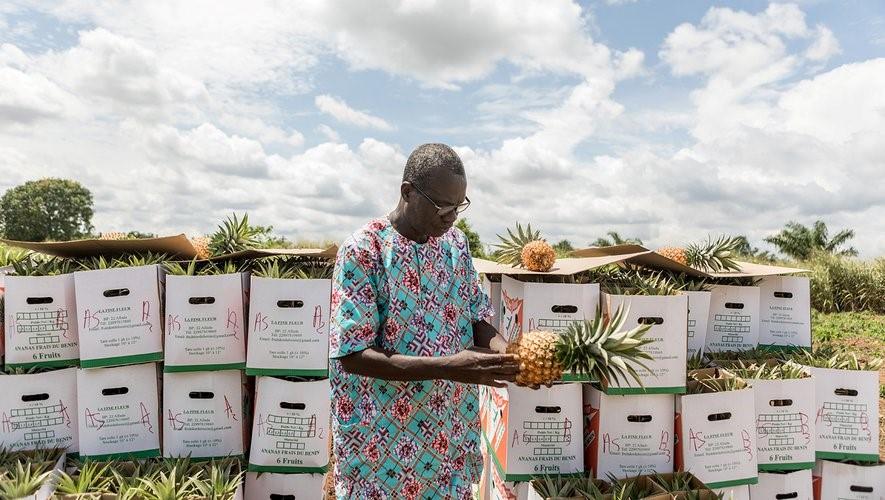
Accompagnement des exportateurs/trices d’ananas au Bénin
Reece-hermine ADANWENON | 10/04/2020
Développement de l’entreprenariat dans la filière ananas (DEFIA) Le Programme DEFIA, mis en place par Enabel au Bénin, porte l’ambition de contribuer à la mise en œuvre du Plan National des Investissements Agricoles de sécurité Alimentaire et Nutritionnelle (PNIASAN) à travers l’amélioration et la sécurisation des revenus agricoles des acteurs des chaînes de valeur de la filière Ananas dans les pôles de développement agricoles du Sud du Bénin. L’objectif est d’augmenter significativement le revenu de 6.000 entrepreneurs agricoles. Les actions portent sur le renforcement des capacités (techniques, économiques, marketing, plaidoyer...) par (i) le développement des services de coaching entrepreneurial et de conseil agricole (ii) la promotion des exportations, (iii) le financement des investissements productifs, (iv) la mise en relation des liens d’affaires entre les producteurs, transformateurs, exportateurs, commerçants, fournisseurs de services financiers comme non-financiers, … et (v) la réalisation des infrastructures structurantes, pour améliorer l’environnement des affaires. DEFIA envisage une complémentarité et synergie d’action avec les autres intervenants dans la chaîne de valeur. Marché de l’exportation de l’ananas et de ses sous-produits La variété de l’ananas « Pain de Sucre » produit au Bénin possède des qualités organoleptiques uniques, ce qui le rend attractif pour les marchés de niche. § 17% des ananas frais produits sont destinés à la consommation locale, 27% sont écoulés au niveau des unités de transformation, 54% sont exportés vers les pays de la sous-région (particulièrement le Nigéria) et 2% exportés vers le marché international, notamment l’Union Européenne. § Il y a une demande en hausse pour l’ananas frais (7%), le jus (4%) et l’ananas séché (2%). § Il existe des marchés potentiels d’exportation : en Afrique de l’Ouest et du Nord pour l’ananas frais et le jus ; au Moyen-Orient pour l’ananas frais, le jus et l’ananas séché ; dans l’Union Européen pour l’ananas frais et séché.Défis liés à l’exportation de l’ananas et de ses dérivés Le pain de sucre a, même mûr : une peau verte, une chair blanche et une durée de conservation plus réduite que les autres variétés, ce qui limite les options d’exportation. § L’hétérogénéité des productions et les problèmes logistiques entraînent des pertes pendant et après la récolte de 10% à 30% de fruits. Le potentiel de valorisation des sous-produits (couronnes, feuilles, cœurs d’ananas, …) n’est pas encore suffisamment exploité ; § Les défis liés aux infrastructures, à la réglementation et au financement limitent l’accès aux marchés et la compétitivité ; § Les capacités en entreprenariat, marketing et contractualisation pour remédier à l’instabilité des prix sur le marché sont limitées. Actions prévues par DEFIA pour les exportateurs d’ananas Plusieurs appuis sont prévus pour les exportateurs en compléments de l’accompagnement aux producteurs et transformateurs : - Facilitation de l’accès des exportateurs aux crédits adaptés (fonds de roulement et équipements), à des expertises techniques, aux certificats et agréments, au marketing en vue de renforcer la compétitivité des entreprises ; - Facilitation de l’accès aux financements supplémentaires pour les infrastructures / équipements de collecte, de transport et de conditionnement pour améliorer le processus de tri et réduire les pertes post-récoltes. - Renforcement de l’accès aux marchés, stimulation des relations d’affaires pour la promotion de l’ananas du Bénin, facilitation de la contractualisation pour remédier à l’instabilité des prix sur le marché. Les actions sont mises en œuvre en partenariat avec l’Agence Territoriale de Développement Agricole (ATDA) pôle 7, l’Agence Béninoise de Sécurité Sanitaire des Aliments (ABSSA), les faitières de la filière ananas et l’interprofession, ainsi qu’avec les structures de financement actives dans l’agriculture dans la zone d’intervention.Conditions d’accès à l’accompagnement de DEFIA Acteurs éligibles Sont éligibles à la subvention, les exportateurs individuels ou les coopératives d’exportateurs d’ananas et/ou de ses produits dérivés installés au Bénin. Rubriques éligibles et niveaux de subventionCritères d’éligibilité et d’attribution Les promoteurs de projets doivent répondre aux critères d’éligibilité suivants : § Avoir un registre de commerce, un identifiant fiscal unique (IFU) et être installé au Bénin ; § Être en relation contractuelle avec des producteurs et/ou des coopératives de producteurs d’ananas ; § Ne pas avoir des impayés financiers avec les autres partenaires techniques et financiers ; § Avoir une expérience d’au moins deux (02) années dans l’exportation de l’ananas frais ou ses produits dérivés justifiés par les contrats ou des bons de commande ; § Ne pas avoir reçu de l’appui financier d’un projet/programme de même nature les deux (02) années précédentes. L’attribution est faite en fonction de la rentabilité et faisabilité du projet proposé. Une préférence sera également accordée aux entreprises qui proposent d’exporter en CAF, les entreprises dirigées par des femmes ou par des jeunes. Le nombre de projets à financer dépend également de la disponibilité du budget du programme. Les entreprises n’ayant pas versé leur contribution financière dans un délai maximal de deux (02) mois, après notification de l’attribution de la subvention, seront exclues. Organisation du dispositif Accompagnement complémentaire de DEFIA aux entreprises d’exportation DEFIA met en place, des prestataires de services non financiers (PSNF) pour le coaching entrepreneurial des exportateurs et leur accompagnement en gestion comptable et financière, le calcul des prix FOB/CAF de cession des produits à l’exportation, l’appui à la confection de business plan, l’éducation financière et la mise en relation avec les structures de financement ; DEFIA renforce les capacités techniques et institutionnelles de trois (03): - systèmes financiers décentralisés (FECECAM, RENACA, ALIDé) pour une offre de services financiers adaptés à la filière ananas ;- DEFIA facilite un appui juridique à l’élaboration des contrats types conformément aux termes et incoterms agréés dans le secteur. Le circuit de demande, de sélection et d’attribution Pour ce qui concerne la partie « subventions » la répartition des opérations de services sera faite de commun accord entre DEFIA et l’exportateur. Pour la partie « crédit » le processus se déroule comme suit : - L’exportateur dépose la demande de crédit complémentaire auprès d’un des SFD/Banque partenaires de DEFIA ;- Si la demande est approuvée par le SFD/Banque, le contrat de prêt est signé avec l’exportateur ; celui-ci ouvre un compte et y verse sa contrepartie. - L’exportateur envoi- à DEFIA les justificatifs de versement de la contrepartie et les copies du contrat de prêt signé. - DEFIA verse dans le compte de l’exportateur le montant de la subvention pour la rubrique partagée ; - Le SFD/Banque décaisse le crédit dans le compte de l’exportateur et celui-ci procède à la réalisation de son contrat avec l’accompagnement des PSNF mis en place par DEFIA.
-

88 coopératives et 35 producteurs bénéficient de la subvention de dessouchage et plantation de rejets d’ananas
Reece-hermine ADANWENON | 10/04/2020
Sur un total de 2674 demandes présélectionnées avec une superficie totale de 3258 ha, une sélection a été faite suivant des critères de plantations tenues par les coopératives et les femmes et la localisation du champ dans les zones non traditionnelles de production ou zones d’extension. Elle a abouti à l’attribution de 123 demandes pour une superficie de 928 ha dont 32% dans les zones d’extension de production d’ananas à savoir : Ouidah, Kpomassè, Ifangni, Adja-Ouèrè, Kétou, Aplahoué, Klouékanmey, Lalo, Athiémé, Comè, Lokossa, Adjohoun, Akpro-Missérété, Abomey, Ouinhi, Za-Kpota , etc.. Après un appel à projet lancé au niveau des producteurs d’ananas et une présélection réalisée par les Cellules communales des Agences Territoriales de Développement Agricole (ATDA) des pôles 7, 6 et 5, une phase d’attribution définitive aux bénéficiaires retenus a été organisée. Le comité d’attribution était composé des représentants de l’Agence Territoriale de Développement Agricole (ATDA) du pôle 7, de l’Association Interprofessionnelle de l’Ananas du Bénin (AIAB), de la Direction Départementale de l’Agriculture, de l’Elevage et de la pêche, et du programme DEFIA. Le programme DEFIA, à travers cette opération ambitionne de contribuer à augmenter les volumes de production d’ananas à travers l’amélioration de la productivité et l’extension des superficies. En plus de l’accompagnement financier, les producteurs seront également accompagnés sur le plan technique, de gestion et de mise en marché de leurs productions, organisés en clusters agricoles.Pour l’évaluation des demandes de subvention, les chefs cellules communales, président des comités de présélection formés L’étude des dossiers de demandes pour la présélection des producteurs actuels ou potentiels pour l’obtention des subventions pour le dessouchage, le labour, la fourniture et la plantation de rejets d’ananas de qualité obéit à des critères prédéfinis. En effet, le processus de la présélection s’est fait suivant un outil d’analyse qui résume l’ensemble des critères ainsi que les principales étapes à franchir par chaque producteur candidat à la subvention. Au cours de l’atelier de formation qui s’est tenu le 08 janvier 2020 à Allada, Salami TENAKAH, responsable de l’intervention 1 de DEFIA et Aristophane APLOGAN, Assistant Technique National Recherche et Innovation de Production, ont passé au peigne fin, les différents points de l’outil d’analyse que les membres des comités communaux de présélection doivent comprendre afin de mieux aborder l’étude des demandes de subvention des producteurs. Après l‘étape d’analyse des fiches de demande, les membres des comités ont procédé à la visite de terrain dans les champs des producteurs à présélectionner pour l’obtention des subventions demandées.
-
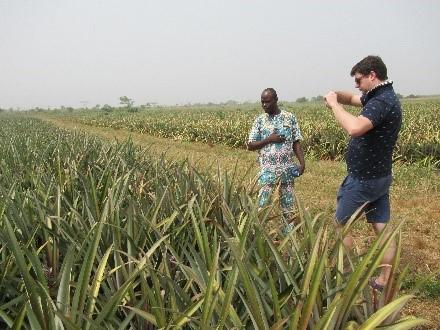
Top Harvest au Bénin pour explorer les possibilités d’importer en Belgique de l’ananas frais du Bénin
Reece-hermine ADANWENON | 10/04/2020
Mr Nicolas VANDENBOGAERDE, Directeur de Top Harvest était en visite d’affaires au Bénin pour explorer la possibilité d’exporter en Belgique de l’ananas frais du Bénin. Une rencontre d’échange entre les Responsables du programme DEFIA et le DG a eu lieu, le 09 janvier 2020 dans la salle de réunion de DEFIA en présence du président de l’Association Nationale des Exportateurs d’Ananas du Bénin (ANEAB) accompagné de trois autres exportateurs. Echanger avec des exportateurs d’ananas du Bénin en vue d’établir des relations d’affaires pour l’importation en Belgique des ananas du Bénin reconnus de meilleure qualité. C’est l’objectif de cette rencontre d’échange qui a permis à la Manager Internationale de DEFIA, de présenter le dispositif d’appui en amont et en aval mis en place par Enabel à travers DEFIA pour garantir la production d’ananas en quantité et en qualité conforme aux exigences des marchés internationaux. La séance a permis également au groupe des exportateurs conduit par le Président de l’ANEAB, de présenter au partenaire, les variétés d’ananas cultivées au Bénin ainsi que les conditions de vente d’ananas. Des échanges, il en ressort que le marché belge constitue une opportunité à saisir par les exportateurs pour la vente des ananas frais. Une première expédition test de 500 Kg d’ananas en Belgique est prévue. En outre, une visite des champs d’ananas à Allada a été organisée avec le partenaire. Elle a permis à l’équipe conjointe DEFIA/ABSSA/ANEAB de faire découvrir au partenaire les variétés d’ananas du Bénin. Mr Nicolas VANDENBOGAERDE a suivi les contrôles sur place pour apprécier la qualité des produits à lui présenter. Son choix s’est porté sur la variété « Pain de Sucre » avec la coloration jaune (C3/C4), poids (1 à 1,4kg).
-
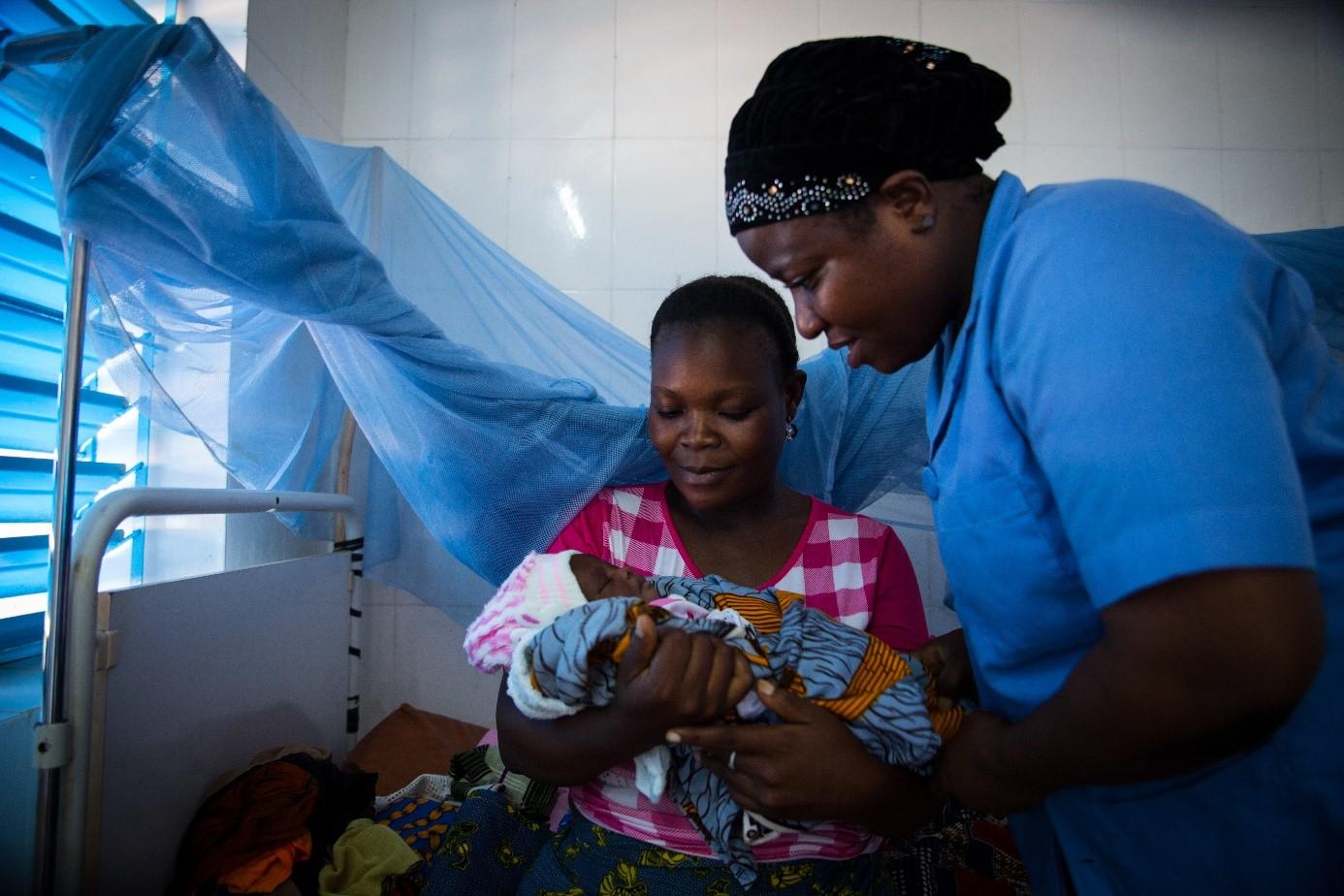
LE PASS SOUROU, UN LEVIER POUR L’AMÉLIORATION DE LA SANTÉ MATERNELLE ET INFANTILE AU BÉNIN
Reece-hermine ADANWENON | 10/04/2020
La situation sanitaire du Bénin reste marquée par des taux de mortalité maternelle et néonatale élevés malgré les efforts continus pour son amélioration. En effet, pour 100 000 naissances, 347 mères décèdent et 7 enfants sur 100 décèdent avant l’âge d’un an, la plupart des décès étant évitables avec des soins préventifs et curatifs de qualité. Par ailleurs, avec les changements du mode de vie, l’émergence et l’aggravation des facteurs de risque, les maladies non transmissibles deviennent un défi pour le secteur de la santé. En effet, plus d’un adulte sur quatre est hypertendu et un adulte sur dix atteint de diabète ont besoin de soins de qualité dans un contexte marqué par une insuffisance de ressources humaines qualifiées et une défaillance du système de maintenance des infrastructures et équipement. Partant de ces constats, le Bénin a entrepris des réformes dans le secteur et a élaboré un Plan National de Développement Sanitaire (PNDS) pour la période de 2009-2018 afin d’améliorer la gouvernance du système et l’accès à des soins de qualité. Initié par l’Agence belge de développement, Le Programme d’Appui au Secteur de la Santé (PASS Sourou) a été conçu avec l’ambition d’appuyer les cinq axes prioritaires du PNDS : l’offre de soins, la disponibilité de ressources humaines qualifiées, une assurance maladie universelle, un système d’investissement et de maintenance des équipements et infrastructures et l’amélioration de la gouvernance. Après 05 années de mise en œuvre du PASS Sourou le bilan est reluisant même si beaucoup reste encore à faire.En s’alignant sur les priorités nationales du PNDS avec un appui aux principales stratégies prioritaires du Ministère de la Santé dans les domaines des Ressources Humaines Sanitaires (RHS), de la Couverture Santé Universelle (CSU), la Politique d’Assurance Qualité (PAQ), les Soins Obstétricaux Néonataux d’Urgence (SONU) et le renforcement du Système d’Information Sanitaire (SIS), le PASS Sourou durant ces cinq dernières années, a contribué au renforcement du système sanitaire au Bénin. Conçu sur la base d’une approche de double ancrage qui se traduit par une opérationnalisation des politiques/stratégies, et la recherche action réflexive, avec utilisation des évidences pour orienter les actions, le PASS Sourou grâce à sa flexibilité a pris en compte les besoins du système de santé ceci en fonction de l’évolution du contexte. D’un budget total de 14 890 223 900 FCFA soit 22.700 000 € avec une contribution nationale de 1 180 722 600 CFA soit 1 800 000 € (nature et exonérations), le programme a couvert les départements de la Donga et du Mono et du Couffo. Le PASS comporte trois volets, à savoir le renforcement de l’offre de services et soins de santé de qualité, l’appui à la demande et à l’instauration du cadre de redevabilité vis-à-vis des bénéficiaires et enfin l’amélioration de la gouvernance sanitaire. Durant 05 années, le PASS Sourou a travaillé sur plusieurs axes à savoir le renforcement de la qualité des soins, la lutte contre les maladies non transmissibles, la disponibilité et une meilleure qualité des soins obstétricaux et néonataux d’urgence, la santé sexuelle des adolescents et jeunes, le renforcement d’une demande structurée des soins, le renforcement des ressources humaines, l’amélioration de la gestion/maintenance des infrastructures et équipements, l’appui à la gouvernance du système de santé. "Il s’agit d’un programme qui a travaillé à renforcer l’épine dorsale du système de santé et s’inscrit dans un développement à long terme de la qualité globale des soins et de leur accessibilité à la population", a déclaré le Dr Didier AGOSSADOU, Secrétaire Général du Ministère de la Santé. Selon lui, le programme a eu le mérite exceptionnel de renforcer également la demande de soins pour un dialogue équilibré avec l’offre. PASS Sourou, quelles actions pour quels résultats ? « Le PASS Sourou a été un véritable programme d’apprentissage dont les résultats et approches méritent d’être capitalisés », dixit un acteur universitaire. Une progression de la qualité des soins dans les structures de santé passant 53% en 2017 à 62% en 2018 Mise en œuvre dans 43 Formations Sanitaires publiques/privées dont 5 Hôpitaux de Zone, la démarche d’amélioration continue systémique, basée sur des indicateurs a permis d’optimiser l’offre de services et des soins de santé d’une qualité effective à la satisfaction des usagers et des prestataires. Dans un contexte caractérisé par une insatisfaction des bénéficiaires marquée par de faibles taux de fréquentation des structures publiques variant entre 15 à 40%, l’amélioration de la qualité des soins s’impose comme une nécessité et constitue une priorité pour le Ministère de la Santé (MS). Le Programme PASS Sourou a appuyé le Ministère de la Santé du Bénin pour la mise en œuvre de sa politique nationale d’assurance qualité (PNAQ) visant à renforcer la qualité des soins au Bénin. De 2014 à 2019, plusieurs actions ont été menées dans les centres de santé des zones d’intervention du PASS Sourou. Entre autres, on peut noter la réalisation de l’état des lieux de la qualité des soins dans les 5 départements de couverture ; la conception du système de mesure de la qualité des soins sur base d’un ‘set’ de 230 indicateurs couvrant cinq domaines : soins médicaux, sécurité des patients et gestion des risques, ressources humaines et demande, infrastructures, management ; la formation et l’opérationnalisation de 86 facilitateurs « qualité » pour conduire les audits qualité ; la réalisation d’audits qualité basés sur les normes, protocoles et standards de soins en vigueur, prenant en compte les perceptions des patients et du personnel dans 43 formations sanitaires incluant cinq hôpitaux de zone, un hôpital privé associatif et 3 structures de soins privées ; l’installation et la fonctionnalité de 5 comités de gestion des plaintes des patients dans les 5 hôpitaux de zone appuyés. Par ailleurs, la mise en place de comité de pilotage assurance qualité dans chaque zone sanitaire permet aux acteurs de la gouvernance, de l’offre et de la demande de se retrouver pour analyser les problèmes de qualité et y trouver des solutions. Ces cadres de redevabilité sont pérennisés avec l’engagement des élus locaux. « Ce comité de pilotage est notre affaire et nous allons travailler à sa pérennité. C’est un cadre pour que nous élus locaux, puissions jouer notre rôle pour la qualité des soins », a confié Mr Ignace WOROU, maire de la commune de Copargo. Le PASS Sourou a induit des améliorations significatives dans la qualité des soins des zones d’intervention. 75% des formations sanitaires engagées dans la démarche qualité ont augmenté leur score qualité moyen de 15% en une année. Cent pourcent (100%) des hôpitaux appuyés utilisent systématiquement la check-list de sécurité chirurgicale, ce qui améliore la sécurité des patients opérés ; la conformité de la prise en charge des cas d’éclampsies lors des accouchements aux normes dans les formations sanitaires sous démarche assurance qualité a progressé en moyenne de 25% entre 2017 et 2018, ce qui réduit les complications graves et les décès maternels et néonatals ; la prise en charge clinique des patients est améliorée conformément aux normes (notamment les cas d’anémie et de paludisme graves qui sont responsables de nombreux décès chez les enfants de moins de 5 ans) ; et 71% des patients en 2018 contre 62% en 2017 se déclarent satisfaits de la qualité des soins reçus dans les formations sanitaires qui sont dans la démarche assurance qualité. De plus, un nouveau modèle d’incinérateur de conception locale est construit à partir de matériaux locaux plus efficace et plus rentable que l’incinérateur classique de type Montfort, donnant des chances plus grandes d’améliorer la gestion des déchets biomédicaux.L’accessibilité des Soins Obstétricaux Néonataux d’Urgence (SONU) de qualité : Une réponse à la mortalité maternelle et néonatale Kpabegou dans le nord du Bénin / Taibatou Ibraima est aide-soignante, au centre de santé de Kpabegou. Elle a été formée sur l’identification des situations d’urgence obstétricale et l’organisation des références par ambulance. Cette formation lui permet de pouvoir identifier et référencer à temps les patients en l'absence du personnel qualifié.Au Bénin, la disponibilité des Soins Obstétricaux et Néonataux d’Urgence (SONU) de qualité est cruciale pour réduire les taux de mortalité maternelle et néonatale. En 2011, aucun centre de santé (Centre de Santé) des zones d’intervention du PASS ne réunissait toutes les fonctions SONU de Base (SONUB) et seuls 5% d’entre eux disposaient de ressources humaines formées sur les SONU. A ceci s’ajoutait une faible disponibilité en intrants de prise en charge des SONU, une discontinuité des prestations offertes et la quasi inexistence d’un système de référence/contre référence (RCR). Afin de relever ces défis, les équipes du PASS Sourou ont entrepris des activités de renforcement des capacités des agents de santé, d’amélioration du plateau technique de soins, d’appui à la transfusion sanguine, d’amélioration du système de référence et de contre-référence et d’appui aux différentes activités d’audit de décès maternels et néo-natals et de supervision. Ainsi, il a été mis en place deux (2) centres de formation SONU (au Centre Hospitalier Départemental du Mono et à l’Hôpital de Zone de Djougou) équipés en modèles anatomiques pour l’apprentissage des fonctions SONU de base (SONU-B) : administration d’antibiotique, d’anticonvulsivants, d’ocytociques, aspiration manuelle intra-utérine (AMIU), délivrance artificielle du placenta, application de la ventouse et la réanimation néonatale. Le PASS Sourou a conduit la formation de plus de 463 prestataires de maternité sur les SONU intégrant la planification familiale et la consultation prénatale (CPN) recentrée, suivi de stages pratiques dans les formations sanitaires. En 2018, 87% des formations sanitaires disposaient d’au moins un prestataire qualifié formé sur les SONU contre 5% en 2015. On note ainsi une meilleure disponibilité SONU B et C : 16 CS SONU B et C en 2018 dans les zones d’intervention contre aucun en 2014 avec 59136 accouchement en institution de soins réalisés en 2018 dans les maternités des zones d’intervention versus 57 131 accouchements en 2017 soit un progrès de 4 %. Par ailleurs, le plateau technique de 110 maternités périphériques a été renforcé avec l’acquisition de 10 ambulances, de ventouses, de kit AMIU, de pingouin, de ballons, de masques de réanimation, d’aspirateurs, de tables d’accouchement et de tables chauffantes de réanimation du nouveau-né. Il a été également mis en place une réorganisation du système de référence et contre-référence avec une amélioration du taux de référence passant de 53% à 84% entre 2014 et 2018. On observe après la mise en place de ces actions une nette amélioration de la qualité des SONU entre 2017 et 2018 passant d’un score moyen qualité de 25% à 63% ; une amélioration de la disponibilité de produits sanguins de 20% entre 2017 et 2018 dans les zones d’intervention. De même, 50% des décès maternels ont été audités dans les zones d’intervention du PASS Sourou contre à peine 29% au niveau national. Ces audits permettent d’apprendre des dysfonctionnements fatals pour éviter leur répétition. Des cadres de concertation sur la santé des adolescents et jeunes ont été également mis en place dans les départements d’intervention permettant de collecter des données sur la santé sexuelle et reproductive des adolescents et jeunes de manière multisectorielle avec une prise de décision adaptée.STOP aux Maladies Non Transmissibles (MNT) En 2015, Enabel a appuyé le Bénin à réaliser une enquête nationale sur l’ampleur des facteurs de risque (FDR) des MNT suivant l’approche STEPS Wise de l’Organisation Mondiale de la Santé (OMS). Il est apparu que parmi les Béninois âgés de plus de 18 ans, plus de 90 % présentent au moins un des huit FDR, que sont, l’hypercholestérolémie, une pression artérielle élevée, une hyperglycémie et surcharge pondérale ou obésité , la faible consommation de fruits et légumes, la sédentarité, le tabagisme et la consommation nocive d’alcool; 26% ont une tension artérielle élevée et 23,2% sont en surcharge pondérale ou obèses et 12,4% des femmes en âge de procréer (18 à 44 ans) cumulent plus de trois FDR. L’ampleur des MNT au Bénin indique qu’en plus d’être un problème de santé publique elles constituent un problème de développement. Comme réponse à ce problème que constituent les MNT, le PASS Sourou a appuyé le Ministère de la Santé pour l’élaboration du plan national de réponse aux MNT sur la période 2017-2022. Il a également appuyé l’opérationnalisation dudit plan avec les résultats ci-après : 134 structures de santé ont été équipées et 460 prestataires de santé formés pour assurer une prise en charge adéquate des MNT, 3065 personnes ont été sensibilisées aux facteurs de risque de MNT et dépistées pour le diabète et l’hypertension artérielle ; 134 Centres de Santé ont été équipés en matériels de base pour le diagnostic et traitement des MNT les plus fréquentes (HTA, diabète, asthme) ; 04 Associations des malades MNT dont 03 nouveaux en 2018, comptant 1976 membres sont mis en place de ; 04 outils clés pour la lutte contre les MNT au niveau communautaire ont été élaborés pour les acteurs communautaires (Relais Communautaires-RC, associations des malades ou toute autre organisations à base communautaire) et les équipes d’encadrement (EEZS, chefs postes) : guide formation du RC, guide de formation du formateur, le cahier du RC, guide de supervision du RC. Les populations prennent la parole et des décisions touchant le système de santé "J’ai amené mon fils de 19 ans à l’hôpital parce qu’il se plaignait de maux de ventre. Arrivé à l’hôpital, les agents m’ont pris de l’argent sans administrer des soins à mon fils qui est finalement décédé. J’ai informé les membres du bureau PUSS dans ma commune et ils ont entrepris des démarches vers les responsables de l’hôpital pour comprendre ce qui s’est passé. Finalement les tords ont été reconnus et mes frais médicaux remboursés. J’ai reçu un chèque de 70 milles", raconte Cyriaque KLIKPEZO, victime de rançonnement dans un hôpital du Bénin. Rançonnement, mauvais accueil, vente illicite de médicaments, mauvaise qualité des soins sont des maux fréquents qui minent les formations sanitaires du Bénin. Le droit à la santé garantit des libertés, mais aussi des droits dérivés tels que «la participation de la population au processus de prise de décision sur les questions de santé aux niveaux national et communautaire ». Malheureusement, les dispositifs mis en place ne permettent pas à l’État de garantir ces droits. Il en résulte une faible fréquentation des formations sanitaires laissant les usagers sans recours en cas de violation de leurs droits. Pour pallier cette insuffisance, la demande de soins a été structurée avec la création de la Plateforme Nationale des Utilisateurs des Services de Soins (PNUSS) qui regroupe des acteurs engagés pour la défense des droits des patients. Les membres PNUSS ont ainsi contribué à la collecte et à la gestion des plaintes dont le nombre et la proportion traitée avec satisfaction ont régulièrement augmenté de 2015 à 2018. Avec la mise en place et l’animation des cadres de concertation et des comités de pilotage départemental rassemblant les gestionnaires des services, les Plateformes des Usagers des Services de Santé (PUSS) et les élus favorisent la redevabilité du secteur santé envers les communautés. Lors du comité de pilotage, les résultats des différents services de santé sont restitués avant une prise de décision visant l’amélioration de la qualité des soins. Aujourd’hui, grâce aux PUSS, le recours pour les usagers non satisfaits des services de santé est une réalité. En 2017, les plaintes traitées ayant abouti à une solution s’élèvent à 389 sur un total de 478, soit 81%. Parmi les plaintes traitées, 46% émanaient des femmes, ce qui montre que l’expression se libère dans un contexte où la tradition, le patriarcat et l’organisation sociale maintiennent la femme dans une situation de forte dépendance vis-à-vis des hommes. Les communautés ont plus de facilité à exposer leur point de vue, à s’exprimer quant à la qualité des services de santé et à obtenir une écoute. De même, l’intervention de la PUSS pour gérer les conflits amène les prestataires de soins à améliorer leurs prestations.Les ressources humaines en santé : une priorité d’action Le PASS Sourou a également permis de renforcer la capacité de gestion des ressources humaines avec l’implémentation du logiciel Irhis et le recensement du personnel de la santé. Les capacités de production de ressources en santé se sont améliorées avec la construction et l’accompagnement pédagogique de l’école de formation des infirmiers et sages-femmes de Parakou (IFSIO) qui a déjà livré sur le marché 75 agents de santé. Des perspectives après le ProgrammeLa démarche d’amélioration qualité en cours constitue un moyen approprié pour préparer les hôpitaux couverts à l’accréditation prévue dans le cadre du volet assurance maladie de l’Assurance pour le Renforcement du Capital Humain (ARCH). Il s’agira donc de poursuivre le renforcement du leadership de la Direction Nationale des Hôpitaux (DNH) et des Directions Départementales de Santé sur le processus Assurance Qualité en vue de sa pérennisation. Pour ce qui concerne les SONU, les réflexions sur la pérennisation des centres de formation SONU et la formation continue du personnel des maternités ainsi que le renouvellement des équipements SONU dans les structures sanitaires sont en cours. Par ailleurs il est prévu la sortie prochaine de 98 infirmiers et sages femme issus de l’Institution IFSIO pour renforcer la disponibilité de personnel dans les centres de santé, nécessitant un encadrement de leur insertion professionnelle. Quant à la pérennisation de la PUSS, son érection en plateforme nationale de usagers de services de santé (PNUSS), dotée de personnalité juridique est un pas important. Des actions pour connecter davantage la PNUSS au niveau communautaire pour un meilleur ancrage sont en voie de mise en place : travail avec les relais communautaires, la référence des cas vers les centres de santé; une intégration des données communautaires au système d’information sanitaire ; le développement de partenariats pour une action plus large au niveau central et national, notamment via un appui à la mise en place d’une ligne verte pour recueillir les plaintes des usagers des Formations Sanitaires..
-
Amélioration de la sécurité alimentaire et nutritionnelle: Un Pari gagné pour Enabel, Croix Rouge de Belgique, Île de Paix, Louvain Coopération et Pro
Reece-hermine ADANWENON | 10/04/2020
Au Bénin, la pauvreté touche 43% des ménages au niveau national et constitue la première cause d’insécurité alimentaire. Cette dernière a pour origine : le faible niveau d’éducation des chefs des ménages, les mauvaises pratiques d’alimentation et de nutrition, une agriculture de subsistance peu diversifiée, l’augmentation du prix d’achat des denrées alimentaires et le non-respect des règles d’hygiène. Selon l’Analyse Globale de la Vulnérabilité et de la Sécurité Alimentaire (AGVSA) réalisée par le Programme Alimentaire Mondial (PAM) en 2014, au Bénin, 1,1 million de personnes sont en insécurité alimentaire, représentant 11 % des ménages. La situation est plus critique dans certaines communes où l’insécurité alimentaire touche plus d’un quart de la population. C’est le cas du département de l’Atacora avec 25% des ménages en insécurité alimentaire. Dans le but d’améliorer la sécurité alimentaire et nutritionnelle dans les 65 villages cibles, des communes de Boukombé, Cobly, Matéri et Tanguiéta, situées dans le département de l’Atacora, Enabel en complémentarité avec 4 autres partenaires Belges ; Croix Rouge de Belgique, Île de Paix, Louvain Coopération et Protos met en œuvre depuis janvier 2016, le Programme d’Appui Multisectoriel à la Sécurité Alimentaire et Nutritionnelle dans l’Atacora (AMSANA). Cette complémentarité d’acteurs permet de mutualiser les expertises spécifiques et ainsi d’intervenir sur les 4 piliers de la SAN (DANS - Disponibilité, Accessibilité, Nutrition et Stabilité). En effet, dans ces communes, l’alimentation et les revenus des ménages dépendent principalement des activités agricoles de la saison des pluies mais aussi des activités de transformation de produits agricoles par les femmes et des revenus complémentaires de travaux saisonniers effectués hors de la région. Les cultures vivrières traditionnelles qui permettent d’atténuer la période de soudure ont été progressivement abandonnées en faveur de la production de coton qui a un impact négatif sur la fertilité du sol et n’est pas toujours rentable pour les producteurs. De plus, la production de maïs bien qu’en hausse ne permet pas d’accroître la sécurité alimentaire notamment à cause du phénomène de bradage et des pertes post-récolte. Grâce aux différentes approches conduites par le consortium Enabel, Croix Rouge de Belgique, Île de Paix, Louvain Coopération et Protos, plus de 10 000 ménages vulnérables ont amélioré leur situation alimentaire et nutritionnelle. Ceci se traduit entre autres, par (1) l’amélioration de la disponibilité des produits maraîchers et vivriers, (2) l’augmentation et la diversification des revenus des producteurs disposant de services économiques, (3) l’adoption par les communautés de meilleures pratiques nutritionnelles et d’hygiène, (4) une meilleure prise en compte des stratégies et interventions d’appui relatives à la sécurité alimentaire et à la prévention de la malnutrition au niveau communal, départemental et national.Des éléments de succès importants « Il y a 03 années en arrière, nous faisions du maraîchage et étions confrontées à un problème de divagation des animaux qui détruisaient toutes nos cultures. Grâce à l’accompagnement du partenaire, nous avons pu sécuriser notre site avec des grillages en fer, que nous avons nous mêmes tissé. Nous avions également un problème d’eau. Pendant la saison sèche nous avons d’énormes difficultés pour arroser nos plants. Grâce au partenaire, nous avons pu creuser des puits et avons de l’eau à notre disposition toute l’année. Dans nos maisons, depuis que nous sommes accompagnées par AMSANA, nos assiettes sont mieux remplies. Nous utilisons nos produits de maraîchage pour améliorer nos repas. Nous avons dans nos assiettes des légumes et des fruits que nous cultivons nous-mêmes. Ensuite nous pouvons commercialiser le reste de la production et cela nous permet d’avoir un peu d’argent pour subvenir aux besoins de nos enfants (scolarité, soins de santé et habillement) », témoigne Odile UNTUWA KOUAN-KOUAN GOU, présidente de l’Association des femmes maraîchères de Boukombé. Depuis 2016 Enabel, en tant qu’institution de coordination du programme AMSANA, œuvre à promouvoir les synergies d’actions sur le terrain avec pour objectif la réduction de la faim et l’amélioration de la diversification alimentaire des ménages. Ainsi, après 04 ans d’intervention, les changements observés sont importants pour les ménages accompagnés sur différentes thématiques (maraîchage, maïs, fonio, amélioration des revenus, conseils nutritionnels, accès à l’eau potable mais aussi intégration maraîchage pisciculture et gestion des déchets solides ménagers). Au niveau des cultures maraîchères et du maïs, par exemple, les techniques de production agro écologiques sont maîtrisées. Aujourd’hui, l’assolement des sites maraîchers est de plus en plus efficace pour améliorer la diversification alimentaire des ménages, grâce à une importante diversification aussi bien des spéculations traditionnelles (crincrin, gombo, etc.) qu’exotique (carotte, choux, etc.) sans oublier l’association des fruitiers (papayes, bananes, agrumes) et dans certains cas, l’introduction de la pisciculture.Selon Jacques CHABBERT, Coordinateur Enabel/AMSANA, en plus de cet assolement cohérent, aujourd’hui l’ensemble des sites maraîchers d’AMSANA bénéficient de clôtures métalliques produites localement. Cela permet de commencer beaucoup plus tôt la mise en culture, mais aussi de mieux protéger les produits maraîchers en saison sèche. Durant 04 ans d’intervention, aux côtés des ménages bénéficiaires, des milliers de personnes ont changé, de façon irréversible, leur manière de faire. Ce changement n’a pu se réaliser que grâce à l’implication de l’ensemble des équipes des structures d’intervention, qui sont passées du statut ponctuel d’agent de développement au statut durable d’acteurs de changements. Des chiffres et des faits… Enabel : La sécurité alimentaire et nutritionnelle améliorée En totale synergie avec les partenaires impliqués dans le maraîchage (Iles de Paix, Protos et Croix rouge), on compte sur l’ensemble des 4 communes pas moins de 20 sites maraîchers et 8 écoles qui ont intégré la pisciculture à leurs activités maraîchères. En complément de ces approches « collectives » 47 bacs hors sol « individuels » ont aussi été mis à disposition des ménages, pour qu’ils pratiquent la pisciculture à l’échelle familiale. La dynamique de la Croix-Rouge pour les conseils nutritionnels, à travers les groupes communautaires, a fondamentalement changé les pratiques nutritionnelles et d’assainissement du cadre de vie des communautés. Les Micro-Projets, portés par Louvain Coopération, ont amélioré le niveau de revenus des ménages, ce qui leur permet de consacrer plus de moyens à l’alimentation sans négliger pour autant les charges liées à l’éducation et à la santé. Croix Rouge : Des pratiques d’hygiène et nutritionnelles améliorées En termes d’hygiène et d’assainissement que ce soit pour le lavage des mains ou la construction de latrines, d’importants changements ont été observés. Dans le village de Tchawassaka par exemple, la défécation à l’air libre est presque éliminée : il y a au moins une latrine par ménage. Aujourd’hui 96% des enfants se lavent systématiquement les mains avant les repas, contre 5% au début du projet. Les enfants étant une courroie de transmission entre l’école et la communauté, des jardins potagers à but pédagogique ont été mis en place dans 32 écoles. Aujourd’hui, 85% de ces enfants répliquent au niveau de leur maison les pratiques apprises à l’école (production de pépinière et itinéraires techniques de plusieurs spéculations par exemple). D’un point de vue général, les taux de malnutrition aigüe modérée (MAM) et sévère (MAS) ont considérablement baissé. La MAM qui était à 5% et la MAS à 3% en début de projet sont respectivement passé à 1.23% et 0.90%, fin 2019. Îles de Paix : Des légumes de contre-saison, du maïs disponible et des revenus améliorés L’utilisation de méthodes agro écologiques (lutte biologique, compost, etc.) pour les productions maraîchères et du maïs est aujourd’hui devenue une pratique courante pour les producteurs. De plus en plus de ménages répliquent au niveau de leurs maisons les techniques apprises sur les sites maraîchers. Cela permet d’améliorer leur alimentation et leur revenu. Le nombre de maraîchers qui ont produit en contre-saison en 2019 est de 681 contre 600 prévus. La technique de compostage promue a totalement été adoptée par les producteurs, surtout par les femmes. L’écart de rendement entre les personnes accompagnées par le projet et les personnes non accompagnées est de 78%. Les formateurs endogènes formés par le projet, ont accompagné à leur tour les producteurs sur les techniques de conservation (séchage et tri au champ par exemple). Deux types de stockage ont été introduits pour améliorer la conservation des productions ; les Greniers Traditionnels Améliorés (GTA) et les sacs PICS tout deux rapidement adoptés par les communautés comme moyen de stockage. A l’heure actuelle 569 GTA ont été répliqués et 975 sacs PICS acquis par les ménages contre respectivement 120 et 400 prévus. Louvain Coopération : Les ménages améliorent leurs revenus à travers les activités liées au fonio, maraîchage, maïs, élevage et les transformations Au niveau de la transformation du fonio, il y a une nette amélioration en termes de décorticage, aussi bien en milieu rural qu’urbain. En milieu rural, l’amélioration est liée aux bonnes conditions de pilage. En milieu urbain, l’amélioration est liée à l’acquisition, l’installation et la formation à l’utilisation de machines de décorticage. Aujourd’hui, la transformation de fonio atteint les 12 tonnes par an, contre 4 tonnes en début de projet. La certification de la qualité microbiologique des produits, obtenue de la DANA il y a de cela 2 ans, a contribué à l’atteinte de ce résultat pour les deux unités urbaines situées dans la ville de Boukombé. De manière générale, la production et la promotion du fonio sont de belles réussites.. Aujourd’hui, le prix de vente du Kg de fonio Paddy est passé d’environ 350 FCFA en 2015 à 550 FCFA en 2019. A l’état actuel, les communautés gagnent de l’argent grâce aux Micro-Projets initiés. Pour l’ensemble des promoteurs financés, leurs revenus se sont accrus de 47% en moyenne entre 2018 et 2019 que ce soit pour la production du maïs, le maraîchage, l’élevage et la transformation.Protos : Une dynamique pour une meilleure valorisation de l’eau Au total 9 sites de production maraîchère ont été aménagés, avec une maîtrise améliorée de l’eau, permettant à 370 producteurs correspondant à 297 ménages de réaliser leur production sur près de 18,25 ha. Quant à l’eau potable, le programme a beaucoup amélioré sa disponibilité à travers la réalisation de 13 nouveaux forages et la réhabilitation de 9 forages d’eau potable essentiellement répartis dans les communes de Boukombé et Cobly. Aujourd’hui les Associations de Consommateurs d’Eau Potable (ACEP) accompagnées par le programme, sont reconnues par les structures compétentes en tant qu’actrice majeure de la veille citoyenne et participent à la prise de décisions sur la qualité des services publics de l’eau. Un travail d’appropriation au niveau des communes sur le volet eau potable a également été constaté. Certaines communes se sont dotées d’agents supplémentaires sur fonds propres pour assurer l’intermédiation sociale dans le secteur. En plus de cela, plusieurs révisions de la tarification de l’eau ont été faites et adoptées par les conseils communaux. Des perspectives pour l’après projet Il est naturellement regrettable que le programme prenne fin aussitôt, alors que d’importantes et significatives dynamiques de changement sont en cours sur le terrain. Cependant, les approches mises en œuvre par les institutions Belges et leurs partenaires Béninois, reposent sur la mobilisation d’acteurs locaux qui ont bénéficié d’importants renforcements de compétence et qui resteront des acteurs durables de changement. Dans le cadre de la stratégie de sortie, l’ensemble des structures d’intervention facilite l’appropriation des dynamiques de changement aussi bien par les acteurs institutionnels que sont les services déconcentrés de l’Etat, mais aussi les collectivités décentralisées afin qu’ils assurent, après la clôture du programme, les facilitations nécessaires pour continuer d’améliorer le niveau de sécurité alimentaire et nutritionnelle des ménages de l’Atacora. « Actuellement, il faut reconnaître que grâce aux dynamiques mises en œuvre de nombreux messages sont « digérés » par les populations et les acteurs qui les accompagnent. Ils ne réfléchissent plus sur les concepts et approches à mettre en œuvre mais sont immédiatement dans l’action », a rassuré Jacques CHABBERT, Coordinateur Enabel/AMSANA.LE MOT DES MAIRES Richard NAMBIME, Maire de Boukombé"Je veux que Boukombé soit une commune pilote pour la production de grillage car ce que nous y faisons c’est du jamais vu dans la zone. L’accompagnement des communes pour créer le poste de PF-SAN est un point très fort qui témoigne de l’internalisation dont a fait preuve le programme AMSANA. C’est une aubaine pour notre commune d’avoir eu, du début à la fin du programme, une personne référente à la Mairie pour traiter les questions de sécurité alimentaire et nutritionnelle".Théophile NEKOUA, Maire de Cobly"La production de légumes pendant la saison sèche va nous permettre de diminuer notre approvisionnement en légumes qui se faisait essentiellement à Tanguiéta. Il y a quelques jours, j’ai même dit aux maraîchers de Datori que bientôt ils pourront vendre leurs produits au Togo voisin." Paul SAHGUI, Maire de Tanguiéta "Le programme AMSANA nous a vraiment permis d’être des acteurs du changement dans notre commune. Le projet Déchets Solides Ménagers (DSM) nous a permis d’avoir des poubelles installées dans presque tous les ménages et une grande partie des hôtels. Aujourd’hui la ville de Tanguiéta est propre et c’est grâce à l’accompagnement d’Enabel sur le projet DSM."Sorikoua SAMBIENI, Maire de Matéri"Le développement n’est pas uniquement une question d’infrastructures, mais plutôt un système permettant à chacun de s’auto-suffire et de se réaliser. Il faut permettre aux gens d’avoir d’abord le minimum, notamment pour se nourrir afin que si l’on réalise une infrastructure ils puissent l’utiliser. Avec la clôture du programme AMSANA, nous négocions actuellement avec d’autres bailleurs de fonds pour l’aménagement des bas-fonds pour le maraîchage et la pisciculture, cela va nous permettre de disposer de plus de légumes et de protéines dans nos plats".
-

Appui au renforcement de l’écosystème de l’économie numérique au Bénin (DigiBoost)
Reece-hermine ADANWENON | 08/04/2020
Le projet DigiBoost-Bénin financé par l’Union Européenne s'inscrit dans le cadre du programme pour la compétitivité en Afrique de l’Ouest sur le 11e FED (2014-2020) dont l’objectif général vise à renforcer la compétitivité de la région avec un accent particulier sur le renforcement des chaines de valeur et filières prioritaires définies au niveau des pays. Pour le Bénin, ce projet propose un appui budgétaire pour renforcer l’écosystème de l’économie numérique et dispose d’un budget indicatif de 2,8 millions d’Euros.Ambitions et Objectif du Projet « DigiBoost »L’intervention a pour ambition de soutenir le secteur du numérique au Bénin. L’objectif est de renforcer et de consolider l’écosystème à travers des appuis aux structures d’accompagnement des startups (incubateurs, accélérateurs, fab labs, espaces de co-working, …) ainsi qu’aux relations entre les acteurs au sein et en dehors de l’écosystème béninois. Pour atteindre cet objectif et, in fine, appuyer la performance des startups numériques au Bénin, trois domaines de changement complémentaires ont été identifiés : 1. Travailler sur l’amélioration de la capacité et de la performance des structures d’accompagnement (incubateurs et accélérateurs). Ce premier pilier pourrait couvrir de nouvelles infrastructures, des équipements, la gamme complète des Business Development Services (BDS) aux startups numériques mais aussi potentiellement un appui à l’accès aux financements. 2. Améliorer la fréquence et la qualité des relations entre les acteurs de l’écosystème 3.0 au Bénin. 3. Améliorer des éléments clés de l’environnement des affaires du numérique au Bénin, notamment l’appui à l’identification et à la structuration des acteurs du numérique.Bénéficiaires de l’Action et zone d’intervention Les bénéficiaires directs du projet sont structurés en plusieurs types de structures d’accompagnement:Les services d’incubation : incluent l’accompagnement (hébergement, conseil, formation, financement) des porteurs d’idées dans la création d’un modèle entrepreneurial lors des premières étapes de la vie d’une entreprise. · Les services d’accélération : services d'accompagnement de la croissance d’entreprise. Ces services répondent aux besoins spécifiques des jeunes entreprises en croissance (aide à l’accès au financement, consolidation des business modèles et plans, aide à l’expansion des activités dans les nouveaux marchés). · Les services de co-working : espaces de travail ou de bureaux partagés regroupant deux notions: un espace de travail partagé, mais aussi un réseau de travailleurs encourageant l'échange et l'ouverture. Les services de prototypage (Fablabs et Maker Spaces) : services d’accompagnement des startups et des entrepreneurs dans la création de prototypes afin qu’ils puissent tester leurs produits ou services en milieu réel. Les bénéficiaires indirects sont: Les startups dans l’économie numérique. Plus qu’une catégorie d’entreprises, le terme « startup » désigne un état temporaire qui est intrinsèquement lié à l’innovation et l’économie numérique et couvre à la fois des porteurs d’idées et des jeunes entreprises. · Les autres acteurs de l’écosystème : Tous les autres acteurs de l’écosystème numérique (partenaires institutionnels, chambres de commerce, entreprises privées, opérateurs téléphoniques, banques, universités et centres de recherche.
-
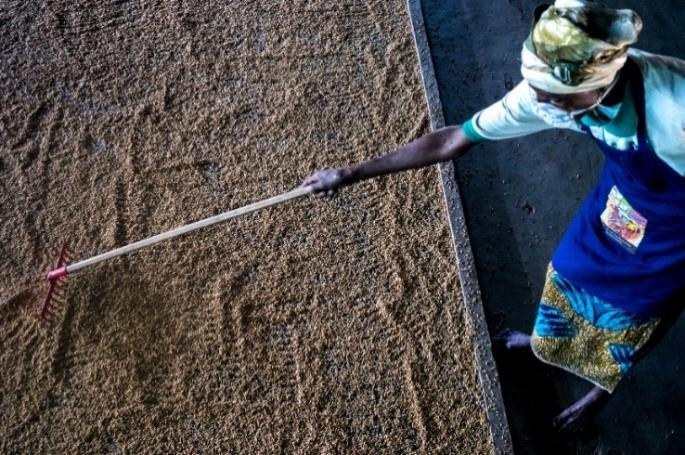
Transition Agro-Ecologique par la Recherche Agricole (TAERA)
Reece-hermine ADANWENON | 08/04/2020
L’agriculture est le moteur de l’économie du Bénin et occupe la majorité de la population du pays. Elle repose sur l’agriculture familiale, qui peine à satisfaire une population urbaine croissante et en demande de produits de qualité constante. Le manque de compétitivité des exploitations agricoles familiales ne leur permet pas de répondre à l’évolution des besoins et des marchés, de plus en plus ouverts et dynamiques. Le changement climatique induit une plus grande variabilité des pluies et le développement de pathologies, qui rendent aléatoires la réussite des cultures. La pression sur les ressources naturelles a atteint ses limites, avec un risque de tarissement des puits ou de salinisation des eaux. Le changement climatique renforce les problèmes liés à la perte de la fertilité des sols. Pour faire face aux enjeux environnementaux et satisfaire les besoins des populations en termes de sécurité alimentaire et nutritionnelle, il sera nécessaire de développer des technologies mieux adaptées aux contextes locaux, durables, résilientes aux changements climatiques et socialement viables. Ambitions du Programme : « TAERA »L’Initiative de l’Union Européenne intitulée « Development Smart Innovation through Research in Agriculture (DeSIRA) » vise à stimuler les innovations dans le secteur de l'agriculture et les systèmes de transformation alimentaire. Enabel a été retenu pour sa mise en œuvre au Bénin à travers le Programme Transition Agro-Ecologique par la Recherche Agricole (TAERA) avec les objectifs et résultats suivants.La stratégie opérationnelle De façon opérationnelle l’intervention travaille sur : Les systèmes de production spécifiques du Sud Bénin, confrontés à de forts enjeux en matière de sécurité alimentaire et de gestion des ressources naturelles : La Recherche Action Participative pour aider les populations et les chercheurs multidisciplinaires dans l’identification de problématiques, la recherche de solutions et l’action collective. Les aspects socio-économiques et de mise en marché avec un accent de prise en compte des contraintes sociaux et économiques parfois des innovations.Processus de diffusion des innovations. La transition agro-écologique de l’agriculture implique des changements au niveau des exploitations agricoles, mais également à d’autres niveaux en aval et en amont des chaînes de valeur.
